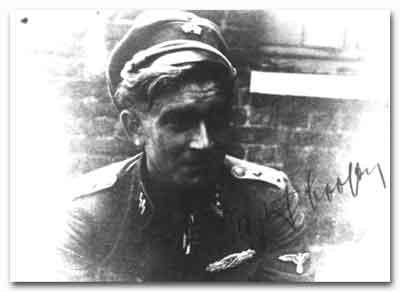
Photo Source: SHI
Award document for the Deutsches Kreuz in Gold
Award document for the Ritterkreuz
SS-Sturmbannführer Siegfried Brosow
Träger des Ritterkreuz des Eiserne
Kreuz

Photo Source: SHI
Award document
for the Deutsches Kreuz in Gold
Award document for the
Ritterkreuz
Siegfried Brosow was born the son of a teacher on 10 December 1918 in Steinfelde, East Prussia. Following high-school in November 1934 he entered the National Political Preparation Facility in Stuhm. Easter 1937 he completed his marticulation examination and belonged to the Hitler Youth from September 1933 to November 1937. After completing his required service from 3 April to 23 October 1937 with the Reichs Arbeits Dienst, he entered service with the SS-Pionierbatallion in Dresden in November 1937. From 1938 to 1939 Brosow attended the SS-Junkerschule in Braunschweig. After his commissioning to SS-Untersturmführer on 20 March 1940, Brosow joined the division "Das Reich" as a platoon, company, and detachment commander.
During the attack West against France on 3 June 1940, SS-Untersturmführer Siegfried Brosow was awarded the Iron Cross Second Class for bravery. After suffering a serious injury in France, he was assigned to the SS-Junkerschule at Bad Tölz from 24 June to 20 November 1942. He subsequently received the Iron Cross First Class on 5 December 1941 during the first assault on Moskow and was promoted to SS-Obersturmführer on 30 January 1942. On 3 November he received the Eastern Medal. On 27 March 1943 he was awarded the General Assault Badge, and on 23 July 1943 the Wound Badge in silver. The German Cross in Gold was awarded to him on 8 September 1943.
On 13 September 1943, SS-Hauptsturmführer Brosow was ordered to establish unit-boundary security positions in the reserve sector bewteen the SS-Panzeraufklärung-Abteilung "Das Reich" and the Grenadierregiment 344. This area signified the southwesterly height 188, just forward of a small wooded area north of Kraschantschen. This strategic point along the front had to be held, at all costs, against any Soviet penetrations.
Heavy Soviet artillery and mortar fire was directed against the German strategic point and the remaining earthworks that lay 500 meters to the north. Once the barrages lifted, but with added strong support from tanks, the Soviet infantry assaulted the German Division's lines from positions near Perekop. While the SS-Panzeraufklärungs-Abteilung "Das Reich" had successfully knocked out 45 T-34 tanks and therby crushed the assault on the right, Soviet infantry managed to breach the German lines in the area of the III./344. Infiltrating the German trench system and moving 1200 meters forward, two Soviet companies launched an attack against the reserve sector. The Soviets were quickly tied down by the defending 1.Pionierkompanie, but tried again and again to gain ground along the street and treeline. Each time they were turned back.
Recognizing the immediate danger, regardless of his weak security reserve, SS-Hauptsturmführer Brosow led a counterattack into the Soviet flanks. With 45 men of the 1.Pionierkompanie, Brosow infiltrated the Soviet occupied trenches under heavy fire. Close combat with submachine pistols and handgrenades ensued as they struggled to reclaim their ground, meter upon meter. After 700 meters and under Soviet artillery fire, heavy German casualties and growing enemy resistance ground the German attack to a halt. Contact with their right flank could not be established. That night, Brosow and his men recaptured the remaining ground during a sweeping night-assault with flamethrowers. The German attack completely routed those Soviet units that had breached the German lines, to include two Soviet battalions that were staging for an attack. Siegfried Brosow and his brave pionieren not only ejected the Soviet presence within the German lines, but they also removed the Soviet threat of splitting the divisional foward positions of "Das Reich" in two. The Soviets were denied use of the main road that led to the only bridge over the Worskla River. For this action Brosow was awarded the Knight's Cross of the Iron Cross on 13 November 1944. SS-Sturmbannführer Brosow's final duty station was the SS-Pionierschule as a Lehrgruppenkommandeur. In 1945 SS-Sturmbannführer Brosow entered Soviet captivity where he remained until October 1955.